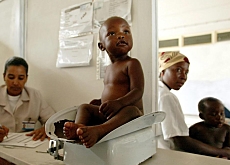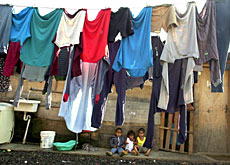$100m boost for Swiss-based malaria venture

The Medicines for Malaria Venture (MMV) has been awarded a five-year grant of $100 million (SFr132 million) by the Bill & Melinda Gates Foundation.
Chief executive of Geneva-based MMV, Chris Hentschel, predicts new antimalarial drugs will be registered from its portfolio of projects before 2010.
The Gates Foundation money will be used to fund more than 20 projects in the MMV portfolio working on developing affordable and practical antimalarial drugs for use in poor countries.
Malaria is a life-threatening disease caused by a parasite and transmitted to humans by mosquitoes.
The disease kills close to one million young children every year, yet it accounts for less than 0.3 per cent of total global spending on health-related research and development.
The philanthropic Foundation, co-founded by the Microsoft billionaire, has committed a total of $258.3 million for malaria research and development to three different bodies this year. Global funding in 2004 for malaria totalled just $323 million.
“For far too long, malaria has been a forgotten epidemic,” said Bill Gates. “It’s a disgrace that the world has allowed malaria deaths to double in the past 20 years, when so much more could be done to stop the disease.”
Public-private partnership
Cheap and widely available drugs that once saved millions of lives are useless now in many areas because of drug resistance.
MMV was created in 1999 with the aim of discovering, developing and delivering new antimalarial drugs through effective public-private partnerships.
The projects on the organisation’s books have to meet certain criteria in their search for an end product. These include: efficacy against drug-resistant strains, a cure within three days, safe for use by small children and pregnant women, and low cost.
The impetus for setting up MMV came from discussions between the pharmaceutical industry and the World Health Organization (WHO) in the late 1990s.
Hentschel told swissinfo how the need to reactivate drug discovery and development was eventually recognised.
“Both the public and the private sector realised that there was a big problem emerging with malaria drugs. There was no real innovation going on, while drug resistance to the available drugs was growing.
According to Hentschel, the public sector didn’t have the know-how, the people or the technology to do the job, so collaboration was necessary.
“The question was how – it wasn’t going to happen normally in the private sector because there isn’t really a commercial return to be made.”
Public-private partnerships facilitated by MMV brought companies back into the area that had previously abandoned malaria research.
MMV is funding research all over the world and some projects are already at the advanced stage of clinical trials. New money has been attracted by the success that is already evident.
Hentschel says that the malaria research environment is significantly better now than at the start of the decade. “We now have the best pipeline of antimalarial drugs for a very long time.”
Malaria is a major public health problem in more than 90 countries, inhabited by 40 per cent of the world’s population.
One of the biggest killer diseases in Africa, Malaria is a primary cause of poverty, seriously undermining development.
Malaria kills between one and two million people annually.
The majority of malaria’s victims are children under five and pregnant women.
Each year 300-500 million new clinical cases of malaria are reported in official statistics; only drugs can be used to cure these potentially fatal infections.
An estimated 75-90% of malaria cases are found in sub-Saharan Africa.
Cheap and widely available drugs that once saved millions of lives are useless now in many areas because of drug resistance.
Spending on malaria research amounts to a tenth of the average spending on global disease research.
The Bill & Melinda Gates Foundation has emerged as one of the leading funders of malaria research since its creation in 2000.
It awarded a grant of $100 million last month to Geneva-based Medicines for Malaria Venture.

In compliance with the JTI standards
More: SWI swissinfo.ch certified by the Journalism Trust Initiative











You can find an overview of ongoing debates with our journalists here . Please join us!
If you want to start a conversation about a topic raised in this article or want to report factual errors, email us at english@swissinfo.ch.